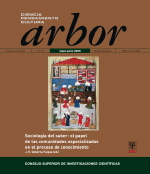Norma y legitimación del conocimiento rabínico: ángeles, hombres y vulgares burros
DOI:
https://doi.org/10.3989/arbor.2008.i731.193Palabras clave:
Decline of the generations, jewish law, rabbinical sources, HalakhahResumen
En el presente artículo se analizan dos ideas comúnmente aceptadas en el judaísmo rabínico: la de que la humanidad vive en un continuo declive espiritual respecto de la época de nuestros piadosos antepasados (yĕridat ha-dorot) y la de que la única voz autorizada a la hora de juzgar es la de los juristas en activo cuya opinión haya alcanzado rango vinculante (posĕqim), aunque diverja de la de autoridades precedentes (hilxeta kĕ-vatraˀe). Me serviré del acuciante problema halájico (“legal”, grosso modo) de las “mujeres encadenadas” (agunot) para trazar la naturaleza y extensión actual de ambas ideas. Antes que a llevar a cabo una completa epistemología de ambas ideas, me centraré en el análisis de la paradoja que resulta del vínculo existente entre reflexión académica y autoridad en el judaísmo rabínico.
Descargas
Citas
Abel, Yehudah, (2006a): “A critique of Za’aqat Dalot”, Working Papers of the Agunah Research Unit 6, 1-28, URL: http://www.mucjs.org/ZD.pdf.
Abel, Yehudah, (2006b): “Halakhah - majority, seniority, finality and consensus”, Working Papers of the Agunah Research Unit 7, 1-24, URL: http://www.mucjs.org/Consensus.pdf.
Abel, Yehudah (2006c): “The plight of the ‘agunah and conditional marriage”, Working Papers of the Agunah Research Unit 4, 1-41, URL: http://www.mucjs.org/MELILAH/2005/1.pdf (publicado con la misma URL en Melilah, 2005).
Berger, Michael Seth, (1992): The authority of the Babylonian Talmud: analysis of its justifications and a proposal for a contemporary model, Nueva York, Columbia University, tesis inédita.
Elon, Menachem, (1994): Jewish law: history, sources, principles, Filadelfia, Jewish Publication Society, vol. i.
Haas, Peter J., (1996): Responsa: literary history of a rabbinic genre, Atlanta, Scholars Press.
Ibn Ḥabib, Moše ben Šělomo (5619/1859-1860): Sefer ezrat našim, Leipzig, s.n., URL: http://www.hebrewbooks.org/8529.
Jackson, Bernard S., (2004a): “Agunah and the Problem of Authority: Directions for Future Research”, Melilah i, 1-78, URL: http://www.mucjs.org/MELILAH/2004/1.pdf.
Jackson, Bernard S., (2004b): “How Jewish is Jewish family law?”, Journal of Jewish Studies lv, 2, 201-229.
Jackson, Bernard S., (2006a): “Internal and external comparisons of religious law: reflections from Jewish Law”, Journal of Comparative Law I, 1, 177-199.
Jackson, Bernard S., (2006b): “Preliminary Report of the Agunah Research Unit”, Working Papers of the Agunah Research Unit 8, 1-45, URL: http://www.mucjs.org/PrelimRep.pdf.
Josephus, Flavius, (1892): Flavii Iosephi opera, Berlín, Weidmann, edición de B. Niese, URL: http://www.perseus.tufts.edu/cgi-bin/ptext?lookup=J.+AJ+1.1.
Katz, Jacob, (5718/1958): “Af al pi še-ḥaṭa Yiśra el hu”, Tarbiz XXVII, 203-217.
Kellner, Menachem Marc, (1996): Maimonides on the "Decline of the Generations" and the nature of rabbinic authority, Albany, State University of New York Press.
Meyuhas-Ginio, Alisa, (2007): “La actitud de los rabinos sefardíes del Imperio Otomano ante los conversos: el caso del yavam mĕšummad”, en: Koch, Yolanda Moreno (ed.), La mujer judía, Córdoba, El Almendro, 129-148.
Orfali Levi, Moisés, (1982): Los conversos españoles en la literatura rabínica: problemas jurídicos y opiniones legales durante los siglos XII-XVI, Salamanca, Universidad Pontificia de Salamanca, Universidad de Granada, Federación Sefardí de España.
Riera i Sans, Jaume, (1986): “El baptisme de rabí Ishaq ben Seset Perfet”, Calls I, 43-52.
Rustow, Marina, (2004): Rabbanite-Karaite relations in Fatimid Egypt and Syria: a study based on documents from the Cairo Geniza, Nueva York, Columbia University, tesis inédita.
Samely, Alexander, (2007): Forms of rabbinic literature and thought: an introduction, Oxford, Oxford University Press.
Skovmand, Keld, (1994): “Nykristne, conversos, marranos, judaister og anusim; et problem, dets historie og en revurdering af det”, Nordisk Judaistik XV, 1-2, 25-50.
Ta-Shma, Israel Moses, (1998): “The law is in accord with the later authority – ‘hilkhata kebatrai’: historical observations on a legal rule”, en: Ben-Menahem, Hanina y Hecht, Neil S. (eds.), Authority, process and method: Studies in Jewish Law, Amsterdam, Harwood Academic Publishers, 101-128.
Weistreich, Avishalom, (2007): “Compelling a Divorce? Early Talmudic Roots of Coercion in a Case of Moredet”, Working Papers of the Agunah Research Unit 9, 1-19, URL: http://www.mucjs.org/Westreich.pdf
Descargas
Publicado
Cómo citar
Número
Sección
Licencia
Derechos de autor 2008 Consejo Superior de Investigaciones Científicas (CSIC)

Esta obra está bajo una licencia internacional Creative Commons Atribución 4.0.
© CSIC. Los originales publicados en las ediciones impresa y electrónica de esta Revista son propiedad del Consejo Superior de Investigaciones Científicas, siendo necesario citar la procedencia en cualquier reproducción parcial o total.Salvo indicación contraria, todos los contenidos de la edición electrónica se distribuyen bajo una licencia de uso y distribución “Creative Commons Reconocimiento 4.0 Internacional ” (CC BY 4.0). Puede consultar desde aquí la versión informativa y el texto legal de la licencia. Esta circunstancia ha de hacerse constar expresamente de esta forma cuando sea necesario.
No se autoriza el depósito en repositorios, páginas web personales o similares de cualquier otra versión distinta a la publicada por el editor.















